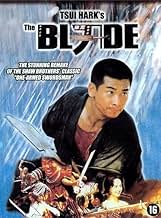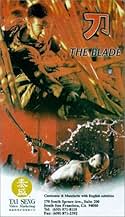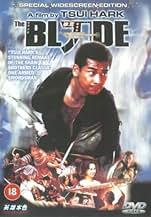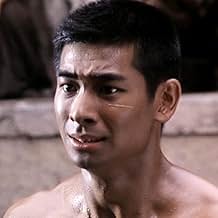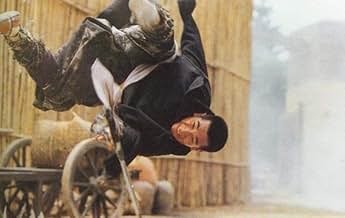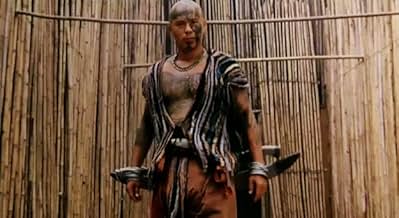IMDb RATING
6.9/10
3.8K
YOUR RATING
A swordsmith trains his friend's orphaned son. The boy seeks revenge for his father's murder but loses an arm rescuing the swordsmith's daughter. A hermit girl nurses him, and he learns swor... Read allA swordsmith trains his friend's orphaned son. The boy seeks revenge for his father's murder but loses an arm rescuing the swordsmith's daughter. A hermit girl nurses him, and he learns swordsmanship with his father's broken sword.A swordsmith trains his friend's orphaned son. The boy seeks revenge for his father's murder but loses an arm rescuing the swordsmith's daughter. A hermit girl nurses him, and he learns swordsmanship with his father's broken sword.
- Awards
- 1 win & 2 nominations total
Xiong Xinxin
- Fei Lung
- (as Xin Xin Xiong)
Collin Chou
- Fast Sabre (Guest star)
- (as Sing Ngai)
- Director
- Writers
- All cast & crew
- Production, box office & more at IMDbPro
Featured reviews
It's rare to see unique perspectives on film during the later '90's. The camera work was interesting. I knew nothing of the director, nor of any of the actors before seeing this movie. Therefore, I "went in blind", with no pre-conceptions. The movie has good action and some gore. Well, ample gore (a plus in my book).
Anyways, some people may find the movie a bit confusing and dis-orienting because the action is fast and furious when it happens. In fact, at times it was difficult for me see who was gashing who. I have to suppose that the camera was speeded up, but it wasn't obvious except that a person should be breathing harder than they were if they were actually moving as fast as it looked they were.
I liked the realistic "gritty" aspects of the lifestyle of the characters that was portrayed in this film. I read in another of the "comments" that the film basically "flopped". Thats unfortunate. People missed out on this one.
I can't comment on the dubbing because the film I saw was in Chinese with English sub-titles, so there was none of that "cheesy voice-makeovers" that usually go on Asian films. Were do they find those voices anyway?
Oh, and the final battle, Excellent!
Anyways, some people may find the movie a bit confusing and dis-orienting because the action is fast and furious when it happens. In fact, at times it was difficult for me see who was gashing who. I have to suppose that the camera was speeded up, but it wasn't obvious except that a person should be breathing harder than they were if they were actually moving as fast as it looked they were.
I liked the realistic "gritty" aspects of the lifestyle of the characters that was portrayed in this film. I read in another of the "comments" that the film basically "flopped". Thats unfortunate. People missed out on this one.
I can't comment on the dubbing because the film I saw was in Chinese with English sub-titles, so there was none of that "cheesy voice-makeovers" that usually go on Asian films. Were do they find those voices anyway?
Oh, and the final battle, Excellent!
A beautifully filmed story of love and heroism, hate and revenge. The main character leaves in pursuit of his father's murderer, brandishing his broken sword as his weapon. Unfortunately, in his first confrontation with the murderer, a tattooed character that looks like he jumped from the pages of a comic book, our hero is brutally beaten and loses an arm. Forced to live a young boy he trains himself in a one-handed sword technique from a book called The Blade, and sets of in search of revenge again.
The great thing about this film (and the sort of thing that upsets people who like seeing martial arts fights where you can see every kick and every punch) is that most of the fighting is just blurs of motion punctuated by shouting and clashing blades. This is what I love in HK fantasies: fight scenes that are so incomprehensible you're left going: huh?
Tsui Hark's best example is Zu: Warriors from the Magic Mountain, where the viewer has to actually fill in the blanks for themselves. It's edited in such a way that that the film we see feels like only a portion of the story. In some contexts this technique would be stupid, but in fantasy it's wonderful. It's the inverse of the computer graphics bare-all approach, and it's lucky that we had the HK film industry to provide an alternative to Hollywood in this regard. (I say had, because, since Storm Riders, cg in HK is more prevalent than before.)
This approach to fight scenes is impressionistic, and with the final fightscene in Dao it's almost operatic. At no stage do you get a feeling that the fight is actually rational. The use of sound and music in the film is also wonderful, especially in the menacing flashback scene. It's hard to think of a more effective way of setting up a backstory, and gives new life to that tired old cliche, the revenge story.
So that's all good. Sometimes, however, the impressionism gets a bit out of hand. Things take on a Wong Kar Wai pretentiousness, like the horrible Ashes of time, where Leslie Cheung sits around feeling sorry for himself for no appreciable reason. In Dao, the voiceover of the female character gets really annoying. Her mutterings only really serve to remind us she is there, as she has only one pivotal scene in the film (where tells the hero his origin story).
The film is also a bit over-bloody for my taste, but it certainly leaves one with no illusions about the brutalness of the world in which the film is set.
Dao is one of those films that is so strange and vivid it leaves a strong resonance with the viewer long after it is over. It has faults by the barrel, but I'd rather have it and Tsui Hark with us than a legion of James Camerons and Roland Emmerichs.
Tsui Hark's best example is Zu: Warriors from the Magic Mountain, where the viewer has to actually fill in the blanks for themselves. It's edited in such a way that that the film we see feels like only a portion of the story. In some contexts this technique would be stupid, but in fantasy it's wonderful. It's the inverse of the computer graphics bare-all approach, and it's lucky that we had the HK film industry to provide an alternative to Hollywood in this regard. (I say had, because, since Storm Riders, cg in HK is more prevalent than before.)
This approach to fight scenes is impressionistic, and with the final fightscene in Dao it's almost operatic. At no stage do you get a feeling that the fight is actually rational. The use of sound and music in the film is also wonderful, especially in the menacing flashback scene. It's hard to think of a more effective way of setting up a backstory, and gives new life to that tired old cliche, the revenge story.
So that's all good. Sometimes, however, the impressionism gets a bit out of hand. Things take on a Wong Kar Wai pretentiousness, like the horrible Ashes of time, where Leslie Cheung sits around feeling sorry for himself for no appreciable reason. In Dao, the voiceover of the female character gets really annoying. Her mutterings only really serve to remind us she is there, as she has only one pivotal scene in the film (where tells the hero his origin story).
The film is also a bit over-bloody for my taste, but it certainly leaves one with no illusions about the brutalness of the world in which the film is set.
Dao is one of those films that is so strange and vivid it leaves a strong resonance with the viewer long after it is over. It has faults by the barrel, but I'd rather have it and Tsui Hark with us than a legion of James Camerons and Roland Emmerichs.
10Manny-54
I must tell you that i'm a little bit shocked and really can't believe that nearly no one has fully grasped this one of the most meaningful and prominent films of our time. Everyone criticizing the surface and the effectiveness but in fact truly missing the point what this film is actually about! A little bit of analysis: At first i have to point out that THE BLADE is enormously similar to Sam Peckinpah's shocking masterpiece from the 1971 STRAW DOGS (and a bit to his companion A Clockwork Orange) both films depicting violence as a natural element or something habitual, in other words the film is implying resonating message that we're just animals with big brains and endless violence we can not be rid of. Blade, SD and ACO are fictitious, ambiguous, allegorical and shocking but in reality are very symbolical and showing the true face of humanity that we are all so scared of! I strongly believe there's also somewhere in those films actually the answer if the peace in the world is even feasible. The Blade has so many symbolical meanings that even the fictional violent world the movie takes place in, only prompting us to apply it to ours. Why? Because the world we're living in is also about the survival like in the film (where is everything only simplified and exaggerated for us just to see the true reality of our world, that's the whole trick). The paradoxical, inadvertent and sometimes very futile violence in the film breeding and producing another violence (e.g. On's revenge for his dead father (where's no redemption) or those exposed little kids watching the bloody fight between that monk and bandits, which is if you think about it enormously provocative vestige of how the world must be so cruel when even a monk has become such a violent beast who then will only manifest that little hint of his smile at those small kids as some kind of a symbol of an inspiration for them - which is very morally inverted). Very common thing in our world is also an involuntary or unconscious act that only brings about another killing and death to others - examples: Ding On inadvertently kills the prostitute Iron Head brought to himself, Ling's father is in fact responsible for a lot of hurt to come when he told Ding On the truth about his father. Chiu Man Cheuk's Ding On initially was against the revenge (mind you the scene after the monk is dead) but Iron Head was all for it who also inadvertently divulged the place where they are from to bandits which would lead to another killing at the end at the Foundry, and etc.. The film even mentions things like buying and selling and at the same time showing the dog approaching some chunk of meat planted right in the big bear jaggy trap which ultimately kills him, the scenes like this are only exaggerated just to give us an idea and feeling of how hard it is to make it through in this world but Tsui Hark de-facto made it clear enough when increased or leveled up the whole hardness of the life in this film and showed us the way how to survive which systematically should be only motivating and inspiring for the viewers of this film. Every time you watch this movie you can find more and more connections between this demented world and ours, which is also the powerful and timeless element of The Blade.
Not Ding On or Iron Head, it was in fact Ling all along who's the most important character (not so strange that the whole film is also off her point of view) as she was also the only one left at the end of the movie still feeling the love for other people but as we see it's late because there's already no one to return her love. What is so paradoxical is that everyone (save for her) in the film was actually neglecting the most important and powerful weapon for this violent world "love", what they were doing was absolutely futile, fruitless, nothing for anyone things which means they ended up as individuals with the complete lack of affection and love for anyone and by this ended up only producing another ceaseless violence that would lead only to downfall of the whole mankind, there was no end to this. So everyone could take the film Blade as the warning or advice - what is virtually the most important for our world!!
I have a more extensive analysis (too long for these comments) of this masterpiece, check out my thread here on The Blade message board!
Not Ding On or Iron Head, it was in fact Ling all along who's the most important character (not so strange that the whole film is also off her point of view) as she was also the only one left at the end of the movie still feeling the love for other people but as we see it's late because there's already no one to return her love. What is so paradoxical is that everyone (save for her) in the film was actually neglecting the most important and powerful weapon for this violent world "love", what they were doing was absolutely futile, fruitless, nothing for anyone things which means they ended up as individuals with the complete lack of affection and love for anyone and by this ended up only producing another ceaseless violence that would lead only to downfall of the whole mankind, there was no end to this. So everyone could take the film Blade as the warning or advice - what is virtually the most important for our world!!
I have a more extensive analysis (too long for these comments) of this masterpiece, check out my thread here on The Blade message board!
This movie was the one of the first true martial artist films I have seen. Since which I have collected a fine library and yet this one still stands out for the story line. A very impressive movie that managed to keep me in rapture during the whole scenario. I would give a big recommendation to any who appreciate martial artist films or just action films to take a look at this one. Even though the movie as I saw it was fairly dark that is easily looked over as the story line pulls you in.
Did you know
- TriviaOne of Quentin Tarantino's 20 Favourite Movies from 1992 to 2009.
- GoofsThe tattoos on Fei Lung's chest disappear when Ding On throws the blade at his throat in the finale.
- ConnectionsFeatured in Video Buck: TOP 13: Las mejores películas de artes marciales (2017)
- How long is The Blade?Powered by Alexa
Details
Contribute to this page
Suggest an edit or add missing content


